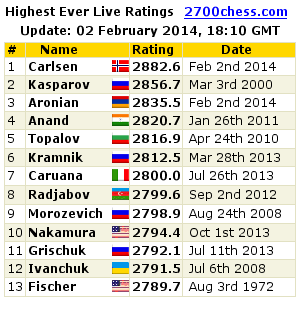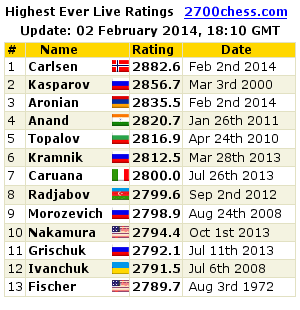
Forgetting Bobby
The March 2014 FIDE rating list has Magnus Carlsen at a new record rating of 2881. A phenomenal milestone for our new World Champion, though one should not forget that the world's number two also achieved a personal best this period. Levon Aronian is now rated 2830, which, despite being over 50 points behind the astonishing Norwegian, gives him an impressive buffer of over 40 points to the rest of the world's elite.
It reminds one of the beginnings of the Federer-Nadal rivalry after the turn of the century. The dominance for over half a decade by those two tennis greats over the rest of the world's best has of course become legendary. For over 430 weeks, the world number one spot was held by either Federer and Nadal, before Novak Djokovic finally broke the dynasty on July 4, 2011. Of course, I'm perhaps not making a fair comparison to modern chess, as I'm sure some of the top ten might argue. Hikaru Nakamura, the United States' top player, for example, is currently sitting in seventh spot at 2772, and arguably in the best form of his life. And he recently, infamously, claimed to be the prime contender to dethrone Magnus as World Champion.
Now, I should say that I like Hikaru. Nobody would ever accuse him of humility, to be sure, but he shoots from the hip, and it's refreshing to hear blunt, honest opinions without the annoying obfuscation that occasionally rears itself in interviews of other elite players. A couple of days ago, Hikaru participated in a Reddit.com "AMA" ("Ask Me Anything"), essentially an open, online forum where he answered questions from anyone. That's something I can respect, and I wish other grandmasters would do more of: raising the profile of chess, giving an insight into the thoughts and workings of the stars, and breaking down the fourth wall between the elite and the public. (The full thread can be found here.)
But of course, the risks that go along with public openness is exposure to criticism - say, for example, by a grandmaster blogger. My gripe is not to do with Hikaru's unbridled optimism about beating Magnus; such (over)confidence is actually very heathy for a chess player's performance. (Incidentally, there has been plenty of research done in behavioural economics and finance about the benefits of overconfidence in occupations where risk aversion can be a hurdle.) Moreover, he might just prove me wrong - certainly, it would be a foolish man to bet against his reaching 2800 on the live ratings at some point this year.
No, the one comment that annoyed me on the Reddit forum was in response to a question about Fischer. The question was:
How do you think Fischer would do against top players like yourself, Carlsen, or Kasparov?
This is a pretty common "pub topic" among chess players: comparing the greats across eras. It's a tough question to answer, and everyone is entitled to their opinion. But Hikaru's answer made me grind my teeth:
"Fischer would almost certainly lose to all of us, but this is due to the fact that the game has so fundamentally changed. If Fischer had a few years to use computers, I think he would probably be on the same level."
Robert J Fischer, considered by many to be the greatest player ever to take the board. Bobby Fischer, who won the World Championship against all the odds, forfeiting one game and giving tie-odds. Who demolished two of the world's greatest players, Taimanov and Larsen, in the Candidates by the unbelievable scores of 6-0, 6-0. Who won 20 consecutive games against the world's elite, including a former World Champion (these days, winning three in a row is considered a streak.)
Now, let's return to the tennis example. How would Jimmy Connors (who was the world tennis number one around the same time as Fischer) fair against Nadal and Federer, if they played at the same time? How would Bjorn Borg or John McEnroe? Lendl, Becker, or Sampras?
It's almost impossible to make this comparison, even though the game of tennis has undergone far more "fundamental change" over its modern lifespan than chess. Of course, I'm assuming that the old greats would be allowed to use a modern racquet in our hypothetical contests, but even without access to today's fitness regimes, vitamin supplements and so forth, it's hard to claim that the legends of tennis from decades past, at their peak, couldn't match it with today's top guys.
One might be tempted to use chess ratings as an objective measure of strength across periods, but unfortunately ELO inflation rules that out, in exactly the same way that comparing the "world's richest people" doesn't make sense without adjusting what a dollar means today to what it meant in former times. 2700chess.com's list of the world's highest ever live chess ratings has only two of the 13 players not currently active - Kasparov and Fischer. All but four of the ratings were achieved in the last three years, and only one was not recorded this century: Fischer, way back in 1972.
There have of course been many attempts made to compare the best chess players of all time. The subjective ones don't really add much weight to my criticisms, although I should add that almost all of them list Fischer in the top three. For example, Keene and Divinsky's book Warriors of the Mind puts Fischer third behind Kasparov and Karpov, but the book, like most of Keene's work, is of dubious integrity. Jeff Sonas, on the other hand, does an impressive statistical job on Chessmetrics, whose list goes Fischer-Kasparov-Botvinnik. Of the current players, only Anand and Kramnik make the top ten, although this was done in 2005 before Carlsen (or, to be fair, Nakamura) had matured.
Perhaps the most credible measure, at least from academic standpoints, is the recent approach of comparing a player's chess moves to the choices of top computer programs. This technique has only been possible in recent years, now that computer engines have so completely superceded human ability. It's not hard to believe that more of this sort of research will be done in the future. And it's also not surprising that, to date, Fischer has been either first or second in all independent studies of this kind.
So what does Hikaru mean by "the game has fundamentally changed"? Unlike tennis, there have been no changes to the equipment we use to play a match. Neither have there been any groundbreaking physical training advancements. Considering his following comment, I can only assume the American number one is referring to the use of computers, and the development of theory, to aid a grandmaster's preparation - and this is undoubtedly true. But how much of a role does that really play? Carlsen himself has shown that victory can be achieved without ever striving for an advantage in the opening.
Moreover, if one really wants, one can construct an opening repertoire based around variations that are light on theoretical developments and unlikely to be refuted by home-cooked computer analysis. They may not be the most ambitious lines, but grandmasters such as Alberto David, Luke Mcshane and even Carlsen are happy to just get playable positions out of the opening, and let their true playing strength decide the result.
If Fischer was transported from his peak to today's chess scene, would he do the same? To be honest, probably not. But I'd wager it'd take no more than a couple of days, rather than a couple of years, for him to get up to date with modern opening theory around his repertoire. And, after that, I doubt anyone of the modern elite other than Carlsen would be able to match it with him.
Consider the relative dominance of the world number ones throughout history. Carlsen is 50 points clear of Aronian at present, which seems a huge margin - and it is. When Fischer achieved his top rating in July 1972, he was 125 points above the number two, who was the incumbent World Champion, Boris Spassky. One hundred and twenty-five points. Then he won the World Championship, despite forfeiting the second game. And then he quit.
When it comes to comparing champions throughout history, everyone can make a claim, and everyone can have an opinion. I have mine. Our transported Bobby has his own ego issues to deal with, and might well have a go at a highly theoretical Sicilian Najdorf or King's Indian instead of playing it safe; this would pave the way for Hikaru to grab a draw or two, or maybe even a win, in a six-game match. I'd wager 4.5-1.5 to the eight-time US Champion. (That's Fischer, in case you were wondering.)
And after a day of theoretical catch-up? 6-0. Game, set and match.

